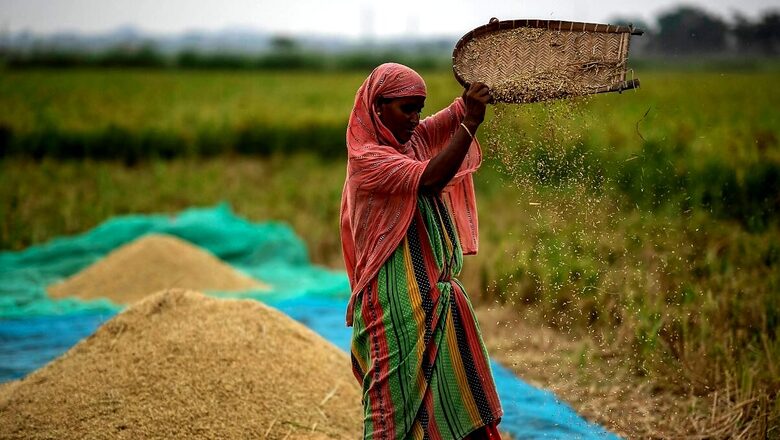
views
In a bid to strengthen the supply chain from farm to fork, foster collaboration between global and Indian food sector stakeholders, and support food processing units near farm gates to ensure better profits for farmers while reducing post-harvest losses, the ministry of food processing industries is taking the lead by hosting ‘World Food India’ from September 19 to 22 in New Delhi.
Additionally, the Union Budget for 2024-25 has allocated Rs 1.52 lakh crore to prioritise agricultural sector development. This funding will focus on climate resilience, productivity, innovation, and processed food exports.
This is critical as agricultural product exports saw an 8 per cent decline, dropping to $48.9 billion in 2023-24 from $53.2 billion in 2022-23. The average annual growth rate of agri-exports was just 2 per cent during 2014-23.
Notably, five products — rice, wheat, meat, spices, sugar, and tea/coffee — account for over 50 per cent of total agricultural exports and are sometimes subject to restrictions in order to balance domestic demands and supplies to control inflation.
Only 25 per cent of our agro-exports are processed or value-added, a figure that has remained virtually unchanged over the past decade. This is significant due to the need for enhanced tech-based operations and production capacity, as well as meeting international standards to tap into the global market.
However, the success of global giants like Nestlé (Switzerland), with an annual turnover of $111 billion in the processed food and beverages sector, demonstrates what is possible with technology and research. Notable Indian firms in the domestic processed agriculture sector, such as Amul, with a turnover of $9 billion, are far behind in operational size, production capacity, and meeting international standards. Nevertheless, with the right support and approach, they can achieve similar success.
Global exports of processed agricultural products are nearing $1 trillion, with Germany ($63 billion) leading, followed by the US ($58 billion), the Netherlands ($57 billion), China ($53 billion), and France ($50 billion).
Room for improvement
Southeast Asian nations like Indonesia, Malaysia, and Thailand are also major exporters of processed agricultural products. While India’s value-added exports increased by $6.5 billion over the last five years since the agro-export policy was introduced, boosting the total to $15 billion, this only marginally improved our global ranking from 21 to 17. There is certainly room for improvement.
The Economic Survey 2023-24 shows that India produces the world’s second-largest annual output of fruits and vegetables, at a substantial 300 million tonnes, trailing only China. However, the processing levels in India are significantly lower, with just 4.5 per cent for fruits, 2.7 per cent for vegetables, 21.1 per cent for milk, 34.2 per cent for meat, and 15.4 per cent for fisheries.
In comparison, China processes 25 to 30 per cent of its produce, while western countries process 60 to 80 per cent. This deficiency in processing capacity results in a significant amount of produce going to waste in India.
Estimates of post-harvest losses in the country range from 18 per cent to 25 per cent across the entire supply chain, though they are believed to be as high as 45 per cent for fruits and vegetables. NITI Aayog estimates annual post-harvest losses at nearly Rs 90,000 crore. To improve this situation, it is suggested that efforts be focused on proper sorting and grading near the farm gate and enhancing processing capacity.
Incentivising farmers
It is crucial to repurpose agricultural incentives to motivate farmers to reduce losses and waste on and near farms. In 2020, the central government announced an agriculture infrastructure fund of Rs 1 trillion to provide medium-to-long-term debt financing for establishing cold chains and post-harvest management infrastructure at farm gates and aggregation points.
Tamil Nadu’s recent unveiling of its food processing policy is a promising step towards reducing wastage and increasing the value of farm produce. The policy encourages farmers producers organisations (FPO) and the food processing industry to access financial support from central schemes. However, it is important to note that Punjab has yet to implement a similar policy, despite the success of neighbouring states like Haryana with their dedicated agribusiness and food processing policy.
Revisit the PLI Scheme
The Production Linked Incentive Scheme for the Food Processing Industry (PLISFPI) has a budget of Rs 10,900 crore ($1.25 billion) for the period 2021-22 to 2026-27, with the specific aim of attracting large, globally competitive firms to produce in and export from India. This scheme seeks to expand processing capacity, build strong Indian brands, increase global market presence, create jobs, and boost farmer incomes.
As of May 2024, 90 per cent of the PLISFPI funds remain unused. The government has disbursed only Rs 1,073 crore among 158 SME beneficiaries, using just 10 per cent of the funds with more than half of the timeline elapsed.
This underuse highlights the need for more focused policy intervention. To achieve the twin objectives of the PLI scheme — global competitiveness and increased exports — these SMEs must form joint ventures with globally established ‘anchor’ firms. Over the past decade, India has attracted FDI worth Rs 500 billion, with 100 per cent FDI being permissible.
The Way Forward
Food processing, considered India’s sunrise industry, plays a crucial role in transforming agricultural development to benefit farmers effectively. A multi-pronged approach that combines minimum support price (MSP), value addition, and industry integration is essential for this transformation due to its strategic importance in ensuring food security.
As the world’s most populous country, India exerts significant environmental pressure, leading to ecological issues such as soil degradation, loss of biodiversity, and water depletion. Within the broader food system, waste reduction emerges as one of the leading climate change mitigation solutions, contributing to reduced emissions throughout the food supply chain from farm to fork.
Incorporating cutting-edge food processing technologies, establishing globally recognised quality standards, and opening access to international markets are vital. This focused strategy to attract global anchor firms will help achieve our goals.
For instance, Apple serves as a prime example of success in the electronics sector; it manufactures 14 per cent of the world’s iPhones in India. Electronics exports, mainly intelligent mobile phones, have surged from under $3 billion in 2020 to $15.6 billion in 2023, leading to the creation of over one lakh jobs. This model should be replicated across various industries.
The ministry of food processing industries should roll out a time-bound outreach programme to attract global anchor firms and facilitate their partnerships with FPOs and SMEs.
(The author is Vice-Chairman of Sonalika ITL Group, Vice-Chairman of the Punjab Economic Policy and Planning Board, Chairman of ASSOCHAM Northern Region Development Council and President of Tractor and Mechanization Association. Views expressed in the above piece are personal and solely those of the author. They do not necessarily reflect News18’s views)




















Comments
0 comment